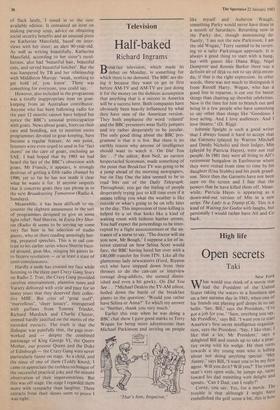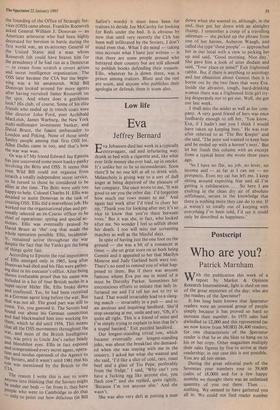High life
Open secrets
Taki
New York
what would you think of a movie that had the President of the United States taking the waters in a Southern spa on a late autumn day in 1941, when one of his friends out playing golf drops in to say hello. 'Say, Bill,' says the President, 'I've got a job for you.' 'Sure, anything you say, Mr President,' says Bill. 'I want you to start America's first secret intelligence organisa- tion, says the President. 'Say, I like that, I like that a lot, Mr President,' says a delighted Bill and stands up to take a prac- tice swing with his wedge. He then turns towards a shy young man who is lolling about not doing anything special. 'Hey Jimmy,' says Bill, 'I want you to be my first agent. Will you do it? Will you?' The young man's eyes open wide, he jumps up, turns toward his dad trembling with delight and spouts, 'Can I Dad, can I really?'
Corny, you say. Yes, for a movie. The trouble is that although I might have embellished the golf scene a bit, this is how the founding of the Office of Strategic Ser- vices (OSS) came about. Franklin Roosevelt asked General William J. Donovan — an American aristocrat who had been highly decorated for heroism in battle during the first world war, an ex-attorney General of the United States and a man whom Roosevelt felt could have beaten him for the presidency if he had run as a Democrat — to create from scratch a covert action and secret intelligence organisation. The OSS later became the CIA but the begin- ning was a bit amateurish. Wild Bill Donovan looked around for more agents after having recruited James Roosevelt on the spot. And where does a gentleman look? His club, of course. Some of his elite friends who ended up in trench coats were film director John Ford, poet Archibald MacLeish, James Warburg, the New York multi-millionaire investment banker, and David Bruce, the future ambassador to London and Peking. None of those seedy Smiley people among that first OSS lot. Allen Dulles came in too, and that's how the war was won.
Or was it? My friend Edward Jay Epstein has just uncovered some more hanky-panky involving the Brits and OSS. It seems that even Wild Bill could not organise from scratch a totally independent secret service, so he turned to those he considered to be allies at the time. The Brits were only too happy to help. Colonel Charles H. Ellis was detailed to assist Donovan in the task of creating OSS. Ellis did a marvellous job. He worked out the organisational plan and per- sonally selected an ex-Czarist officer to be chief of operations: spying and special ac- tivities. Ellis was eventually praised by David Bruce as 'the' cog that made the whole operation possible. Ellis, incidental- ly, remained active throughout the war despite the fact that the Yanks got the hang of things quite fast.
According to Epstein the real importance of Ellis emerged only in 1965, long after Donovan had died and his files were gather- ing dust in his executor's office. After being shown irrefutable proof that his name was included in a list of four British moles in a super-secret Hitler file, Ellis broke down and confessed. Yes, he had been recruited as a German agent long before the war. But that was not all. The good part was still to come. Yes, you guessed it. The Soviets had found out about his German connection and had blackmailed him into working for them, which he did until 1956. This means that all the OSS movements throughout the War, and most of the British Intelligence I.°0, was privy to Uncle Joe's rather beady and bloodshot eyes. Ellis in fact exposed and compromised every secret agent, opera- tion and modus operandi of the Agency to the Soviets, and it wasn't until 1981 that his
role was mentioned by the British to the CIq
The reason I write this is not to scare anyone into thinking that the Soviets might be under our beds — far from it; they have People who went to Cambridge to do that
only to point out how delicious (in Bill Safire's words) it must have been for traitors to deride Joe McCarthy for looking for Reds under the bed. It is obvious by now that until very recently the CIA has been well infiltrated by the Soviets. I don't mind even that. What I do mind — taking into account what I have just written — is that there are some people around who betrayed their country but are still allowed to publish books defending their treason. Ellis, wherever he is down there, was a prince among traitors. Blunt and the rest are scum, and anyone who publishes their apologia or defends them is scum also.







































 Previous page
Previous page